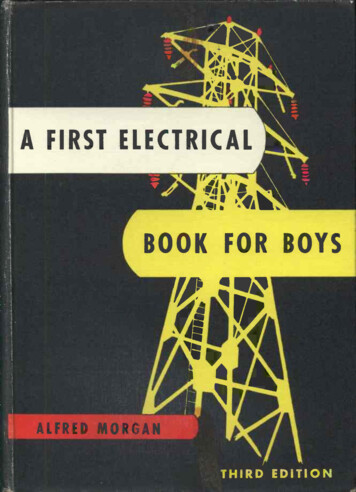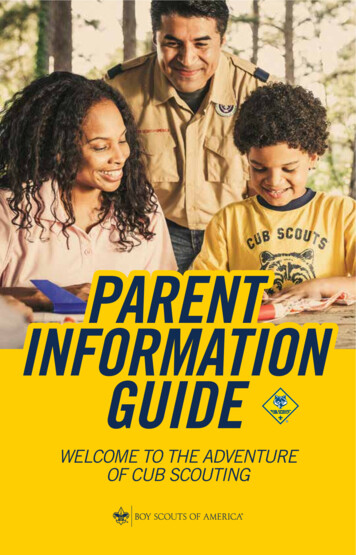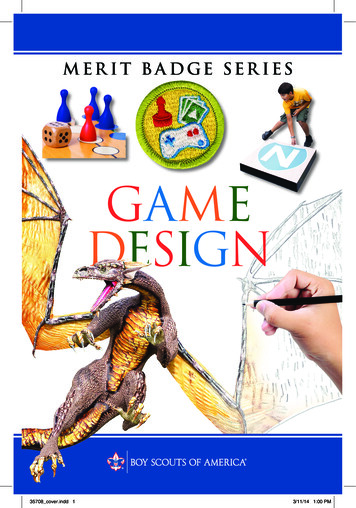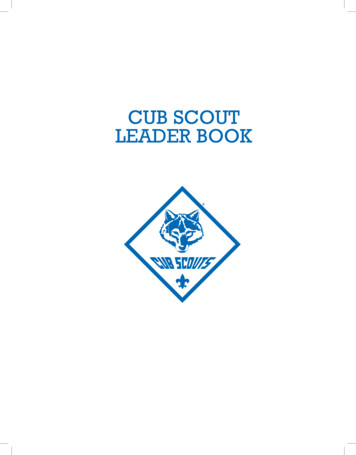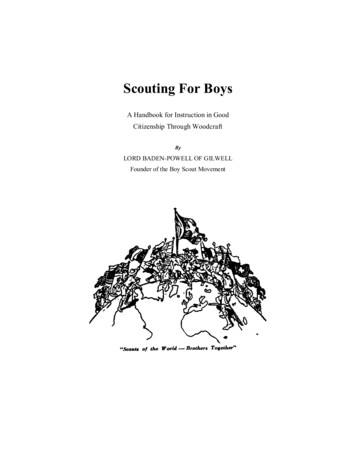
Transcription
Scouting For BoysA Handbook for Instruction in GoodCitizenship Through WoodcraftByLORD BADEN-POWELL OF GILWELLFounder of the Boy Scout Movement
Downloaded from:“The Dump” at or’s Note:The reader is reminded that these texts have been written a long time ago. Consequently, theymay use some terms or use expressions which were current at the time, regardless of what wemay think of them at the beginning of the 21st century. For reasons of historical accuracy theyhave been preserved in their original form.If you find them offensive, we ask you to please delete this file from your system.This and other traditional Scouting texts may be downloaded from the Dump.
ContentsIntroduction and Explanation of ScoutingCampfire Yarn No. 1 – Scouts’ WorkCampfire Yarn No. 2 – What Scouts DoCampfire Yarn No. 3 – Becoming a ScoutCampfire Yarn No. 4 – Scout PatrolsCampfire Yarn No. 5 – Scout PatrolsCampfire Yarn No. 6 – Sea and Air ScoutingCampfire Yarn No. 7 – Signals and CommandsCampfire Yarn No. 8 – PioneeringCampfire Yarn No. 9 – CampingCampfire Yarn No. 10 – Camp CookingCampfire Yarn No. 11 – Observation of “Sign”Campfire Yarn No. 12 – SpooringCampfire Yarn No. 13 – Reading “Sign” or ObservationCampfire Yarn No. 14 – StalkingCampfire Yarn No. 15 – AnimalsCampfire Yarn No. 16 – PlantsCampfire Yarn No. 17 – EnduranceCampfire Yarn No. 18 – Health–Giving HabitsCampfire Yarn No. 19 – Prevention of DiseaseCampfire Yarn No. 20 – Chivalry to OthersCampfire Yarn No. 21 – Self–DisciplineCampfire Yarn No. 22 – Self–ImprovementCampfire Yarn No. 23 – Be Prepared For AccidentsCampfire Yarn No. 24 – AccidentsCampfire Yarn No. 25 – Helping OthersCampfire Yarn No. 26 – CitizenshipCampfire Yarn No. 27 – Our Commonwealth and EmpireCampfire Yarn No. 28 – Our World-Wide Brotherhood
PREFACEScouting has been described by more than one enthusiast as a revolution in education. It is notthat.It is merely a suggestion thrown out at a venture for a jolly outdoor recreation, which has beenfound to form also a practical aid to education.It may be taken to be complementary to school training, and capable of filling up certain chinksunavoidable in the ordinary school curriculum. It is, in a word, a school of citizenship throughwoodcraft.The subjects of instruction with which it fills the chinks are individual efficiency throughdevelopment of — Character, Health, and Handicraft in the individual, and in Citizenshipthrough this employment of this efficiency in Service.These are applied in three grades of progressive training for Wolf Cubs, Scouts, and Rovers.Their development, as this book will show you, is mainly got through camping and backwoodsactivities, which are enjoyed as much by the instructor as by the boy; indeed, the instructorsmay aptly be termed leaders or elder brothers since they join in the fun, and the boys do theeducating themselves.This is perhaps why Scouting is called a revolution in education.The fact is true, however, that it aims for a different point than is possible in the average schooltraining. It aims to teach the boys how to live, not merely how to make a living. There lies acertain danger in inculcating in the individual the ambition to win prizes and scholarships, andholding up to him as success the securing of pay, position, and power, unless there is acorresponding instruction in service for others.With this inculcation of self-interest into all grades of society it is scarcely surprising that wehave as a result a country divided against itself, with self-seeking individuals in unscrupulousrivalry with one another for supremacy, and similarly with cliques and political parties,religious sects and social classes, all to the detriment of national interests and unity.Therefore the aim of the Scout training is to replace Self with Service, to make the ladsindividually efficient, morally and physically, with the object of using that efficiency for theservice of the community.I don’t mean by this the mere soldiering and sailoring services; we have no military aim orpractice in our movement; but I mean the ideals of service for their fellow-men. In other words,we aim for the practice of Christianity in their everyday life and dealings, and not merely theprofession of its theology on Sundays.The remarkable growth of the Scout movement has surprised its promoters as much as its outsidesympathisers. Starting from one little camp in 1907, of which this book was the outcome, theMovement has grown and expanded automatically.This points to two things: first, the attraction that Scouting has for the boys; secondly, thevolume of that innate patriotism which underlies the surface among the men and women of ournation in spite of the misdirection of their education towards Self. Thousands of these form a
force of voluntary workers, from every grade of society, giving their time and energies for noreward other than the satisfaction of helping the boys to become good citizens.The teaching is by example, and the boys are quick to learn service where they have before themthis practical exposition of it on the part of their Scoutmasters. The effects of this training whereit has been in competent hands have exceeded all expectation in making happy, healthy, helpfulcitizens.The aim of these leaders has been to help not merely the promising boys, but also, and moreespecially, the duller boy. We want to give him some of the joy of life and at the same time someof the attributes and some of the opportunities that his better-off brother gets, so that at least heshall have his fair chance in life.All countries have been quick to recognise the uses of Scouting, and have in their turn adoptedand developed the training exactly on the lines given in this book.As a consequence there is now a widespread brotherhood of Boy Scouts about the worldnumbering at present some 6,000,000 (1954) members, all working for the same ideal under thesame promise and Law, all regarding each other as brothers, and getting to know each otherthrough interchange of correspondence and personal visits on a considerable scale.It needs no great imagination to foresee vast international possibilities as the outcome of thisfast-growing brotherhood in the near future. This growing spirit of personal friendship andwide-minded goodwill among the future citizens of the nations behind it may not only give it thatsoul, but may prove a still stronger insurance against the danger of international war in thefuture. This may seem but a wild dream, but so would it have been a wild dream had anyoneimagined forty years ago that this little book was going to result in a Brotherhood of over sixmillion Boy Scouts to-day and a corresponding sisterhood of some three and a quarter millionGirl Guides and Girl Scouts.But such is the case.And such vision is not beyond the range of possibility, if men and women come in to take theirshare in the promotion of the work.The co-operation of tiny sea insects has brought about the formation of coral islands. Noenterprise is too big where there is goodwill and co-operation in carrying it out. Every day weare turning away boys anxious to join the Movement, because we have not the men or women totake them in hand. There is a vast reserve of loyal patriotism and Christian spirit lying dormantin our nation to-day, mainly because it sees no direct opportunity for expressing itself. Here inthis joyous brotherhood there is vast opportunity open to all in a happy work that shows resultsunder your hands and a work that is worth while because it gives every man his chance ofservice for his fellow-men and for God.Old Socrates spoke truly when he said, “No man goeth about a more godly purpose than he whois mindful of the right upbringing not only of his own, but of other men’s children.”B.-P.N.B.:The statistics on membership have been brought up-to-date (1954) and are three times aslarge as when B-P. last revised this preface.
EXPLANATION OF SCOUTINGN.B.—Sentences in italics throughout the book are addressed to Scoutmasters (instructors).By the term “scouting” is meant the work and attributes of backwoodsmen, explorers, andfrontiersmen.In giving the elements of these to boys we supply a system of games and practices which meetstheir desires and instincts, and is at the same time educative.From the boys’ point of view Scouting puts them into fraternity-gangs which is their naturalorganization, whether for games, mischief, or loafing; it gives them a smart dress andequipment; it appeals to their imagination and romance; and it engages them in an active, openair life.From the parents’ point of view it gives physical health and developnzent; it teaches energy,resourcefulness, and handicrafts; it puts into the lad discipline, pluck, chivalry, amid patriotism;in a word, it develops “character”, which is more essential than anything else to a lad for takinghis way of life.The principle on which Scouting works is that the boy’s ideas are studied, and he is encouragedto educate himself instead of being instructed.The principle is in accord with that of the most up-to-date educationalists. The training isprogressive and adapted to the changing psychology of the growing boy.The Wolf Cubs, encouraged to develop themselves as individuals, mentally and physically.The Boy Scouts, developing character and sense of service.The Rover Scouts, for practice of the Scout Ideals of Service in their citizenship.From the national point of view our aim is solely to make the rising generation into goodcitizens.We do not interfere with the boy’s religion, of whatever form it may be, though we encouragehim to practise whichever he professes.Our training divides itself under four heads:—1.Individual character training in resourcefulness, observation, self-reliance to gain theScout’s Badge.2.Handicrafts or hobbies which may help a boy to make his way in life, for which we give“Proficiency” badges.3.Physical Health, by encouraging the boy to take plenty of exercise and to look after hisbody.4.Service for the State, such as fire brigade, ambulance, missioner, life-saving, or othercollective public duty by the troop.Scouting appeals to boys of every class, and can be carried out in towns just as well as in thecountry.When a Scoutmaster has not sufficient knowledge in any one subject he can generally get afriend who is an expert to come and give his troop the required instructions.
Funds must be earned by the Scouts themselves, by their work, not by begging. Various ways ofmaking money are given in this book.A Wolf Cub Pack, Scout Troop, and Rover Crew form what is called a Group under a GroupCommittee which co-ordinates the work of all branches.Wolf Cubs.— The training of the Wolf Cubs is founded on the romance of the jungle, and is keptas dissimilar as possible from that of the Scouts in order that, on the one hand, the Scouts shallnot feel that they are playing a “kid’s game”, while the Cubs, on their part, will look forward tothe new atmosphere and novel activities they will come in for when they attain the age andqualifications for “going up” into the Scout Troop.The details of the organization and training of Wolf Cubs will be found in “The Wolf Cub’sHandbook” and “Tenderpad to Second Star”Rover Scouts.—Rover Scouts are Scouts over 17 and in exceptional cases younger. They areorganized in Rover Crews in their Group.The object of their institution is to complete the sequence of the Wolf Cub, Scout, and Rover.The training of the Cubs and Scouts is largely a preparation for rendering Service which isconsummated in practice by the Rover. Such Service in many cases takes the form of helping inthe administration and training of the group. Thus the progressive cycle becomes complete fromCub to Scoutmaster. In this way the Scoutmaster, while retaining the young man under goodinfluence at the critical time of his life, gains valuable help for himself in his work, and, in suchcases as are fit for it he turns out further recruits for the ranks of the Scoutmasters, while for thenation he supplies young men trained and qualified for making good useful citizens.The details of organization and training of Rovers are to be found in the Headquarters handbooklet, “Plan for Rover Scouts”, while the spirit and moral ideas are given in “Rovering toSuccess”Girl Guides.— The Girl Guides’ Association is a sister organization for girls on precisely similarlines and principles, though differing of course in detail.The Scout programme is applicable to other existing boy organization and has had particularlygood results in schools for Deaf Mutes, the Blind, the Handicapped, Boys’ Training Schools andthe Churches.
FOREWORDI Was A Boy Once.The best time I had as a boy was when I went as a sea scout with my four brothers about on thesea round the coasts of England. Not that we were real Sea Scouts, because Sea Scouts weren’tinvented in those days. But we had a sailing boat of our own on which we lived and cruisedabout, at all seasons and in all weathers, and we had a jolly good time—taking the rough with thesmooth.Then in my spare time as a schoolboy I did a good lot of scouting in the woods in the way ofcatching rabbits and cooking them, observing birds and tracking animals, and so on. Later on,when I got into the Army, I had endless fun big-game hunting in the jungles in India and Africaand living among the backwoodsmen in Canada. Then I got real scouting in South Africancampaigns.Well, I enjoyed all this kind of life so much that I thought, “Why should not boys at home getsome taste of it too?” I knew that every true red-blooded boy is keen for adventure and open-airlife, and so I wrote this book to show you how it could be done.And you fellows have taken up so readily that now there are not only hundreds of thousands ofBoy Scouts but over six millions about the world!Of course, a chap can’t expect to become a thorough backwoodsman all at once without learningsome of the difficult arts and practices that the backwoodsman uses. If you study this book youwill find tips in it showing you how to do them— and in this way you can learn for yourselfinstead of having a teacher to show you how.Then, you will find that the object of becoming an able and efficient Boy Scout is not merely togive you fun and adventure but that, like the backwoodsmen, explorers, and frontiersmen whomyou are following, you will be fitting yourself to help your country and to be of service to otherpeople who may be in need of help. That is what the best men are out to do.A true Scout is looked up to by other boys and by grownups as a fellow who can be trusted, afellow who will not fail to do his duty however risky and dangerous it may be, a fellow who isjolly and cheery no matter how great the difficulty before him.I’ve put into this book all that is needed to make you a good Scout of that kind. So, go ahead,read the book, practise all that it teaches you, and I hope you will have half as good a time as Ihave had as a Scout.Chief Scout of the World.
INTRODUCTIONBy LORD ROWALLANChief Scout of the British Commonwealth and EmpireTo those who are reading this new edition of Scouting for Boys for the first time it may be of interest toset down what information it has been possible to glean about the way in which the book was composed.Owing to the kindness of Lady Baden-Powell, B.-P.’s private diaries and letters have been read, and fromthese some fresh facts can be given. Another source of information is the portion of the originalmanuscript now in the possession of I.H.Q. The story is far from complete, but we now know much morethan was available even twelve months ago.The manuscript is on many kinds of paper and was evidently written at many times and in many places.The earliest dated portion, the yarn on “Tracking,” contains one page written on notepaper addressed“Harwood, Bonchester Bridge, Hawick, N.B.” (Perhaps it should be explained that” N.B.” stands for”North Britain “ and is an outmoded way of saying “Scotland.”). The date of this is June 18, 1907. B.-P.had an amusing habit of occasionally using notepaper for his manuscripts ; one page, for instance, is onSavoy Hotel paper; others are from addresses in Kensington and Newcastle.The diary shows that actually on that date, June 18th, B.-P. was staying at the Izaak Walton Hotel,Dovedale, on a fishing holiday. The entry under June 18th is marked with a large red cross and reads,“Got 6½ brace.” Then for June 19th,“Wrote S for B most of the day—writing 9 hours.”The next date is July 15th with the entry “Wimbledon; a letter to his mother from Mill House,Wimbledon, dated July 16th, contains the following passage,“It is perfectly delightful here, and I am getting on with my writing very well—being entirely my ownmaster—and very quiet sitting out in the garden all day.”Nothing further is given until the diary entry of December 22nd, when B.-P. was at Middleton inTeesdale; he noted,“Worked all morning on S for B.”One point of interest is that one of his letters to his mother (dated December 21, 1907) is on Boy Scoutnotepaper.The next date is December 26th, and the diary reads,“Went into residence at Mill House” (i.e. Wimbledon).A letter to his mother dated December 30th contains this passage,“All goes well here, I am working hard—enjoying frequent walks between whiles in this splendid air.”Though Scouting for Boys is not mentioned here, we know that he was then writing it because Sir PercyEverett has told us how he used to visit B.-P. at Wimbledon and discuss the book.From the diary we learn that he left Mill House on January 6th, 1908, but there is no evidence of how farat that date the book was completed. Although publication began that month, the whole was not ready, forunder the date February 24th is the note, “Sent in Part V of S for B.” That is the last reference.The manuscript suggests that Part VI gave him the most trouble; this, however, is a conjecture, since thesurviving manuscript is not complete. There are three drafts for this Part—it was entitled “Notes for
Instructors; it was later called “Principles and Methods.” In two of the drafts much space is given todeveloping the theme, “The same causes which brought about the fall of the great Roman Empire areworking to-day in Great Britain.” B.-P. had been deeply impressed by an anonymous pamphlet entitled“The Decline and Fall of the British Empire. A brief account of those causes which resulted in thedestruction of our late Ally, together with a comparison between the British and Roman Empires.Appointed for use in the National Schools of Japan, Tokio, 2005.” This was published in 1905. (Historyseems to have reversed the roles of Great Britain and Japan !). It was, as the title indicates, an imaginativeaccount of what might happen if we did not pull up our socks. So greatly was B.-P. impressed that hisfirst two drafts for the last part of Scouting for Boys were mainly on this theme and hardly touched onmany of the topics he later discussed; and now it has all been condensed to a sentence. The main text ofthe book was not radically changed in any of the later editions revised by B.-P., but this last part healtered considerably from edition to edition.It is important to realise that every development of Scouting has been produced on the demand of theboys themselves. B.-P. indeed never intended that Scouting for Boys should be other than an addition tothe training already provided by the Boys’ Brigade, the Y.M.C.A., and other organisations. It was theboys who got hold of the Book, formed their own Patrols and found their own Scoutmasters. It wasbecause the sisters would not stay away that the Guides were born; the little brothers made the WolfCubs inevitable, and the unwillingness of those who had outgrown the Scout Troop to sever allconnections with it brought in Rovering.Once again in recent years the older boys in many places wanted more virile activities than were possiblefor the 11 and 12-year-old. Senior Scouts were the only answer. Many of the Courts of Honour hadalready banded the older boys into Patrols of their own and the new branch was merely a recognition ofestablished fact. Scouting provides, if we use it rightly, what the boys want; not what we older peoplethink they should want.Scouting for Boys remains the basis for Scouting and the source of inspiration for Scoutmasters. WhenScouting has failed it has been because we have departed from the Patrol System and have failed to trustthe boys with responsibility, because we have made our Scouting too nearly a school subject and not a lifeof joyous adventure. Boys, particularly those who have reached adolescence, demand a challenge to theirpowers of mind, body and spirit. Scouting can and does provide that challenge if we use it aright. Readthis book, not just once nor even twice, but constantly. Each reading will provide something new. Eachreading will give us just that inspiration which we require to prevent us from becoming stale. We mustrecognise that through all the changes in our national life, in our educational system and our ideas ofrecreation, B.-P. did “know best.” While minor amendments may be necessary from time to time, thefundamentals of Scouting which have produced the most universal brotherhood of youth the world hasseen, remain secure as a monument to one of the greatest benefactors to mankind.1951Chief Scout.
CHAPTER 1SCOUTCRAFTHINTS TO INSTRUCTORSInstruction in scouting should be given as far as possible through practices, games, andcompetitions.Games should be organized mainly as team matches, where the patrol forms the team, and everyboy is playing, none merely looking on.Strict obedience to the rules to be at all times insisted on as instruction in discipline.The rules given in the book as to games may be altered by Scout-masters where necessary to suitlocal conditions.The ideas given here are merely offered as suggestions, upon which it is hoped that instructorswill develop further games, competitions, and displays.Several of the games given here are founded on those in Mr. Thompson Seton’s “Book ofWoodcraft”, called “Spearing the Sturgeon” (Whale Hunt), “Quick Sight” (Spotty Face), “Spotthe Rabbit”, “Bang the Bear”, “Hostile Spy” (Stop Thief), etc.A number of non-scouting games are quoted from other sources.The following is a suggestion for the distribution of the work for the first few weeks. It is merelya Suggestion and in no sense binding.Remember that the boy on joining, wants to begin “Scouting” right away; sodon’t dull his keenness, as is so often done, by too much preliminary explanationat first. Meet his wants by games and scouting practices, and instil elementarydetails bit by bit afterwards as you go along.N.B.—The previous paragraph was in the former editions of this book, but it was in some casesignored by Scoutmasters, with the result that their training was a failure.Remember also to start small. Six or eight carefully chosen boys will be enough to begin with,and after they have received Scout training for a month or two, they will be fit to lead andinstruct fresh recruits as they are admitted.
FIRST EVENINGIndoorsAddress the boys on ‘Scoutcraft”, giving a summary of the whole scheme, as in this chapter, withdemonstrations or lantern slides, etc.Form Patrols, and give shoulder-knots.FOLLOWING DAYSPractical work, outdoors if possible, from the following:— Alternatives according to whether intown or country, indoors or out.Parade, break National Flag and salute it.Scouting game: e.g., “Scout Meets Scout” (see page 47).Practise salutes, signs, patrol calls, scouts’ chorus, etc.Practise making scout-signs on ground.Tie knots.Make ration bags, leather buttons, etcSelf-measurement by each Scout of span, cubit, finger, joint, stride, etc. (see page105).Send out scouts independently or in pairs to do a “good turn”, to return andreport how they have done it (page 23).March out the Patrol to see the neighbourhood.Make them note direction of starting by ‘compass, wind, and sun (see pages 6472).Notice and question them on details seen, explain “land marks”, etc. (see page65).Practise Scout’s pace (see page 63).Judge distances (see page 106).Play a Scouting Wide Game (see “Games”, page 181).Or indoors if wet—”Ju Jitsu”, “Scouts’ War Dance”, Boxing, Scouts’ Chorusand Rally, etc.Camp Fire Yarns from this book or from books recommended.Or rehearse a Scout play, or hold Debate, Kim’s Game, etc.Patrols to continue practice in these throughout the week in their own time or under theScoutmaster, with final games or exercises on the following Saturday afternoon.If more evenings than one are available in the week one of the subjects might be taken in turnmore fully each evening and rehearsals carried out of a display.
CAMP FIRE YARN NO. 1SCOUTS’ WORKPeace Scouts - Kim - Boys of MafekingI suppose every boy wants to help his country in some way or other.There is a way by which he can so do easily, and that is by becoming a Boy Scout.A scout in the army, as you know, is generally a soldier who is chosen for his cleverness andpluck to go out in front to find out where the enemy is, and report to the commander all abouthim.But, besides war scouts, there are also peacescouts—men who in peace time carry out workwhich requires the same kind of pluck andresourcefulness.These are the frontiersmen of the world.The pioneers and trappers of North America, thecolonists of South America, the hunters of CentralAfrica, the explorers and missionaries over Asia andall wild parts of the world, the bushmen and droversof Australia, the constabulary of NorthWest Canadaand of South Africa — all these are peace scouts,real men in every sense of the word, and good atscoutcraft:The colonists, hunters, and explorers all overthe world are all scouts. They must knowhow to take care of themselves.They understand how to live out in the jungle.They can find their way anywhere, and are ableto read meanings from the smallest signs andfoot tracks. They know how to look after theirhealth when far away from doctors. They arestrong and plucky, ready to face danger, andalways keen to help each other. They areaccustomed to take their lives in their hands, andto risk them without hesitation if they can helptheir country by doing so.They give up everything, their personal comfortsand desires, in order to get their work done.The life of a frontiersman is a grand life, but tolive it, you must prepare yourself in advance fordifficulties that may arise.
They do it because it is their duty.The life of the frontiersmen is a grand life, but it cannot suddenly be taken up by any man whothinks he would like it, unless he has prepared himself for it. Those who succeed best are thosewho learned Scouting while they were boys.The life of a frontiersman is a grand life, but to live it, you must prepare yourself in advance fordifficulties that may arise.Scouting is useful in any kind of life you like to take up. A famous scientist has said that it isvaluable for a man who goes in for science. And a noted physician pointed out how necessary itis for a doctor or a surgeon to notice small signs as a Scout does, and know their meaning.So I am going to show you how you can learn scoutcraft for yourself, and how you can put it intopractice at home. It is very easy to learn and very interesting when you get into it.You can best learn by joining the Boy Scouts.The Adventures of KimA good example of what a Boy Scout can do is found in Rudyard Kipling’s story of Kim.Kim, or, to give him his full name, Kimball O’Hara, was the son of a sergeant of an Irishregiment in India. His father and mother died while he was a child, and he was left to the care ofan aunt.His playmates were all native boys, so he learned to talk their language and to know their ways.He became great friends with an old wandering priest and travelled with him all over northernIndia.One day he chanced to meet his father’s old regiment on the march, but in visiting the camp hewas arrested on suspicion of being a thief. His birth certificate and other papers were found onhim, and the regiment, seeing that he had belonged to them, took charge of him, and started toeducate him. But whenever he could get away for holidays, Kim dressed himself in Indianclothes, and went among the natives as one of them.After a time he became acquainted with a Mr. Lurgan, a dealer in old jewelry and curiosities,who, owing to his knowledge of natives, was also a member of the Government IntelligenceDepartment.This man, finding that Kim had such special knowledge of native habits and customs, saw that hecould make a useful agent for Government Intelligence work. He therefore gave Kim lessons atnoticing and remembering small details, which is an important point in the training of a Scout.Kim’s TrainingLurgan began by showing Kim a tray full of precious stones of different kinds. He let him look atit for a minute, then covered it with a cloth, and asked him to state how many stones and whatsorts were there. At first Kim could remember only a few, and could not describe them very
accurately, but with a little practice he soon was able to remember them all quite well. And so,also, with many other kinds of articles which were shown to him in the same way.At last, after much other training, Kim was made a member of the Secret Service, and was givena secret sign—namely, a locket or badge to wear round his neck and a certain sentence, which, ifsaid in a special way, meant he was one of the Service.Kim in Secret ServiceOnce when Kim was travelling in the train he met a native, who was rather badly cut about thehead and arms. He explained to the other passengers that he had fallen from a cart when drivingto the station. But Kim, like a good Scout, noticed that the cuts were sharp, and not grazes suchas you would get by falling from a cart, and so did not believe him.While the man was tying a bandage over his head, Kim n
2. Handicrafts or hobbies which may help a boy to make his way in life, for which we give “Proficiency” badges. 3. Physical Health, by encouraging the boy to take plenty of exercise and to look after his body. 4. Service for the State, such as fire brigade, ambulance, missioner, life

